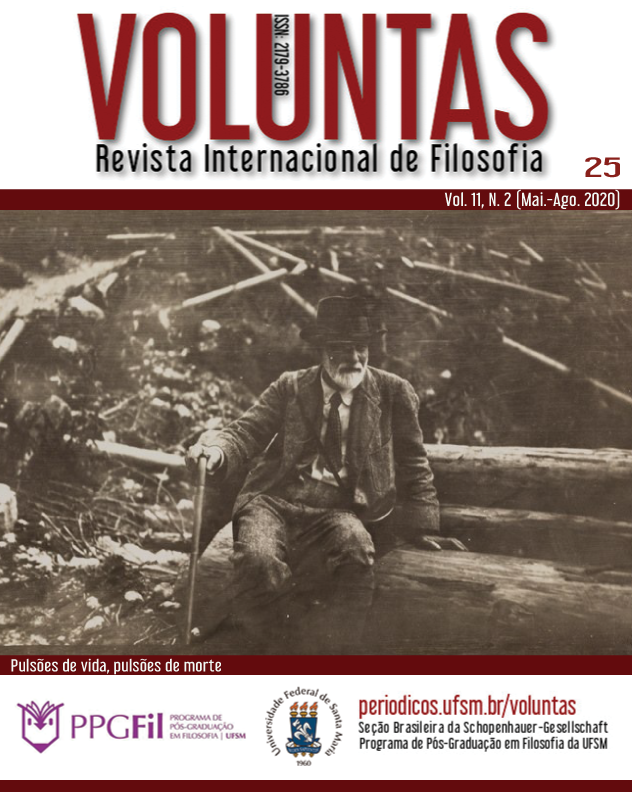Freud, Lacan and Laclau: The artful intersection between discourse, drive and jouissance
DOI:
https://doi.org/10.5902/2179378643610Keywords:
Discourse Theory, Enjoyment, Pulsation, Ernesto Laclau, Jacques Lacan, FreudAbstract
The Lacanian conception of a split and decentered subject and its consequences, implicated in language and discourse, radically subverted a significant part of the field of studies concerning discursiveness. We can inscribe Ernesto Laclau's outstanding Theory of Discourse as a deepening of this Lacanian subversion, incorporated into a comprehensive investigation of socio-political and identity processes. In this article, we promote an analysis of the theoretical implications of the psychoanalytic device present in his Theory of Discourse from three directions: (A) the assumptions of 'irreducibility of meaning' and 'logic of the signifier' as a starting point; (B) and the implication of the category ‘split and decentralized subject’ imposed on the grounding of the field of discourse ‘beyond the areas of speech or writing’; (C) The third axis, the most explored, articulates the theoretical relationship between ‘discourse, pulsional field and enjoyment (la juissance)’, rethought by Laclau in the limits and consequences of the political. Finally, we propose some formalizations as a way to demonstrate the explicit theoretical game.Downloads
References
COPJEC, J. (2004) Imagine there’s no woman: Ethics and Sublimation, Cambridge: MIT Press. DOI: https://doi.org/10.7551/mitpress/3668.001.0001
DUNKER, C. I. L. (2017) Uma via indireta para a abordagem do afeto: libido, gozo, pulsão escópica, Tempo Psicanalítico, Rio de Janeiro, v. 49.1, p. 9-36.
Holy Motors. Direção: Leos Carax. Imovision, 2012. DVD (1h 55 min).
EHRENBERG, Alain (2011) La fatigue d’être soi : dépression et société, Paris : Fayard.
HOWARTH, D. (2000) Discourse, Buckingham: Open University Press.
JARDIM, Ricardo. (2013) Energética e Hermenêutica: “o Problema epistemológico do Freudismo” discutido por Paul Ricoeur – PROMETEUS.
KEHL, Maria R. (2009) O tempo e o cão: a atualidade das depressões, São Paulo: Boitempo.
LACAN, J. (1955-56/1977). O Seminário Psicoses. Livro 3. Rio de Janeiro: Zahar Editores.
LACAN, J. (1956-57/1995) O seminário, Livro 4 – A relação de objeto – Rio de Janeiro: Jorge Zahar.
LACAN, J. (1959-60/2008) O seminário, Livro 7 – A Ética da Psicanálise. Rio de Janeiro: Jorge Zahar.
LACAN, J. (1961-62/2003) O seminário, Livro 9 – A identificação. Recife, : Centro de estudos Freudianos do Recife, (não oficial).
LACAN, J. (1962-63/2005) O seminário, Livro 10 – A Angústia. Rio de Janeiro: Jorge Zahar.
LACAN, J. (1964/1988) O seminário, Livro 11 – Os quatro conceitos fundamentais da Psicanálise. Rio de Janeiro: Jorge Zahar.
LACAN, J. 1966-67/2008) O seminário, Livro 14 – A Lógica do Fantasma. Recife, : Centro de estudos Freudianos do Recife (não oficial).
LACAN, J. (1967-68/2008) O seminário, Livro 16 – De um Outro ao outro, Rio de Janeiro: Jorge Zahar, 2008
LACAN, J. (1969-70/1991) O seminário, Livro 17 – O Avesso da Psicanálise, Rio de Janeiro: Jorge Zahar.
LACAN, J. (1972-73/1989) O seminário, Livro 20 – Mais ainda - Rio de Janeiro: Jorge Zahar.
LACAN, J. (1993) Televisão - Rio de Janeiro: Jorge Zahar.
LACAN, J. (1972/2017) Conférence de Louvain, La Cause Du Désir, (N° 96), p. 7-30 DOI: https://doi.org/10.3917/lcdd.096.0007
LACLAU, E. (2013) A razão Populista. São Paulo: Três Estrelas.
LACLAU, E. (2014) El discurso, lo político y la dimensión ontológica: Una entrevista con Ernesto Laclau: Revista de la Academia/ISSN 0719-6318 Volumen 22/Primavera 2016 (Publicado originalmente en Distinktion. Journal of Social Theory, Vol. 15, ISS 3, pp. 255-262. Tradução de José Fernando García)
LACLAU, E. (2014b) Los fundamentos retóricos de la sociedad, Ciudad Autónoma de Buenos Aires: Fondo de Cultura Económica
LACLAU, E. MOUFFE, C. (1987) Hegemonía y estrategia socialista. Hacia una radicalización de la democracia. Madrid: Siglo XXI España.
MANSET, G. (1991) Revivre, Paroles et Musique: France (musica).
MILNER, J. C. – (1992/2010) Linguística e Psicanálise (Linguistics and Psychoanalysis). Estud. Lacan.[online] , vol.3, n.4. (Publicado originalmente nas versões online e em papel da Encylopædia Universalis. [cf. Corpus, Paris: Encylopædia Universalis France S. A., n. 13, pp. 858-62, 1992]. Traduzido por Paulo Sérgio de Souza Jr, IEL-UNICAMP)
PEREZ D. O; STARNINO, A. (org) (2018) Por que nos identificamos? Curitiba: CRV.
RICOEUR, P. (1977) De l’interprétation, essai sur Freud. Paris: Seuil, 1965. Em português: Da interpretação, ensaio sobre Freud, Rio de Janeiro: Imago
RICOEUR, P. (1969) Le conflit des interprétations: essais d’herméneutique . Paris: Seuil,
SAFATLE, Vladimir (2016). O circuito dos afetos: Corpos politiciso, desamparo e o fim do indivíduo – São Paulo: Editora Cosac Nayfy.
SOLER, C. (2004) Ce que Lacan disait des femmes. Paris : Éditions du Champ Lacanien, 2004. DOI: https://doi.org/10.3917/chla.001.0009
SOLER, C. Les affects lacaniens – Paris: PUF – 2016
STARNINO, A. (2016) Sobre Identidade e identificação em Psicanálise: um estudo a partir do Seminário IX de Jacques Lacan– Curitiba/UFPR: Revista Dois Pontos , 2016 DOI: https://doi.org/10.5380/dp.v13i3.46901
STARNINO, A. (2018) Entre o couro e a carne: Jacques Lacan e questão da identidade e identificação. Dissertação (Filosofia) – UNICAMP. Campinas.
STARNINO, A. 2019) Les affects sont effects:Para pensar a noção de afeto em Jacques Lacan. Modernos & Contemporâneos, v. 3, p. 44-65
STAVRAKAKIS, Y. (2010) Discourse, affect, jouissance: Psychoanalysis, Political Theory and Artistic Practices, Istanbul: Art & Desire Seminars, June.
VALAS, P. (2011) As dimensões do gozo: Do mito da pulsão a deriva do gozo, Rio de Janeiro: Jorge Zahar Ed.
d.
Published
How to Cite
Issue
Section
License
The submission of original manuscripts to this journal implies the transference, by the authors, of the copyrights for printed and digital publication. The copyrights of a published manuscript belong ultimately to the author, and only the copyright for its first publication is reserved to the journal. Authors may only use the same results in other publications explicitly indicating this journal as the medium of the original publication.
Licence
Attribution-NonCommercial-ShareAlike 4.0 International (CC BY-NC-SA 4.0) - This license lets others remix, tweak, and build upon your work non-commercially, as long as they credit you and license their new creations under the identical terms.






